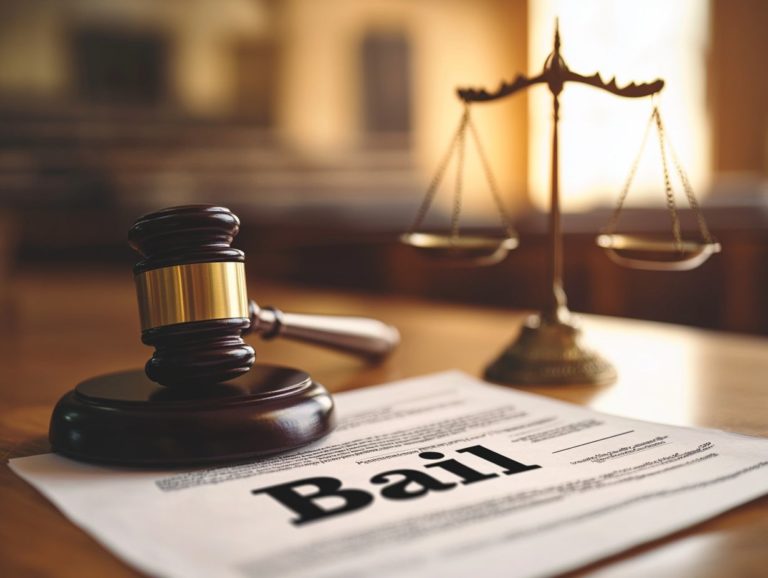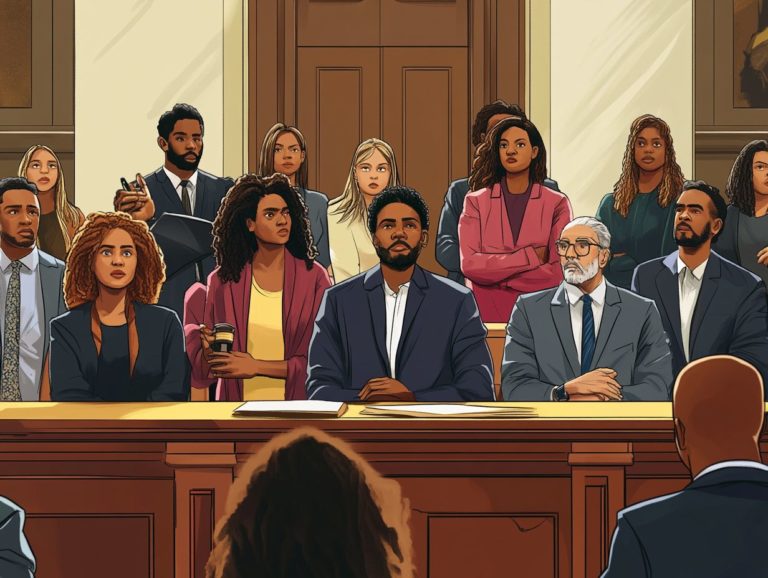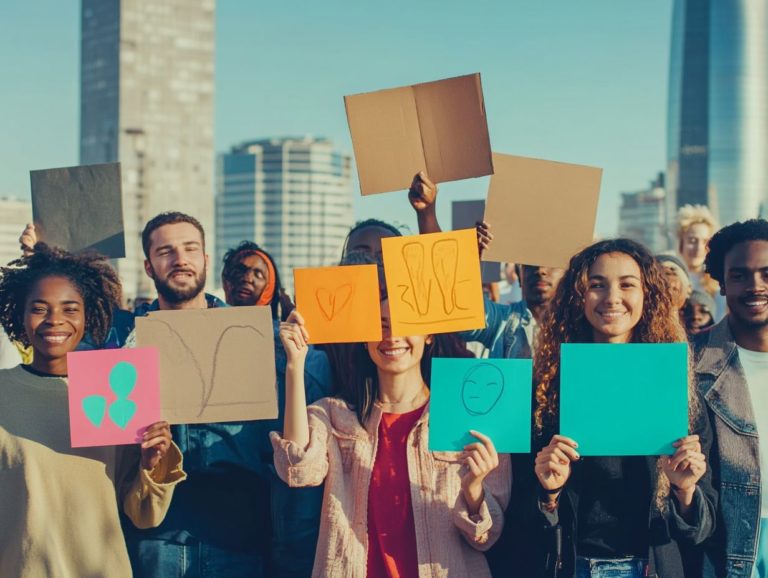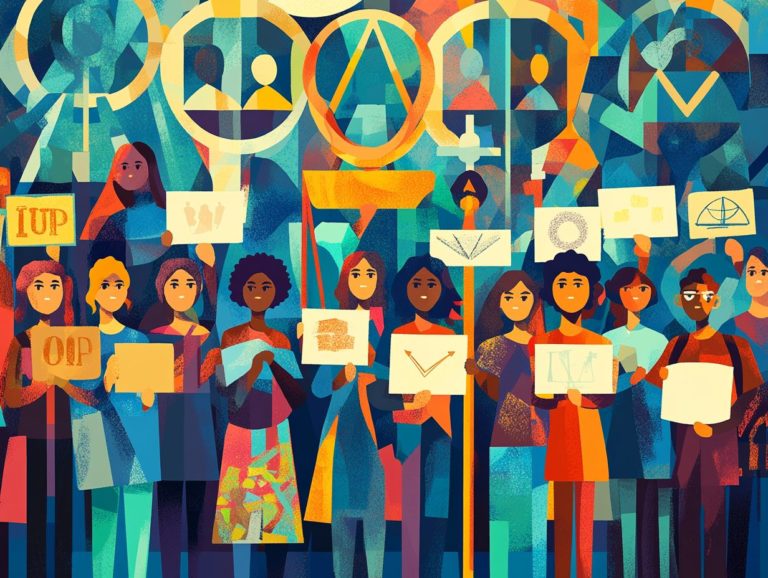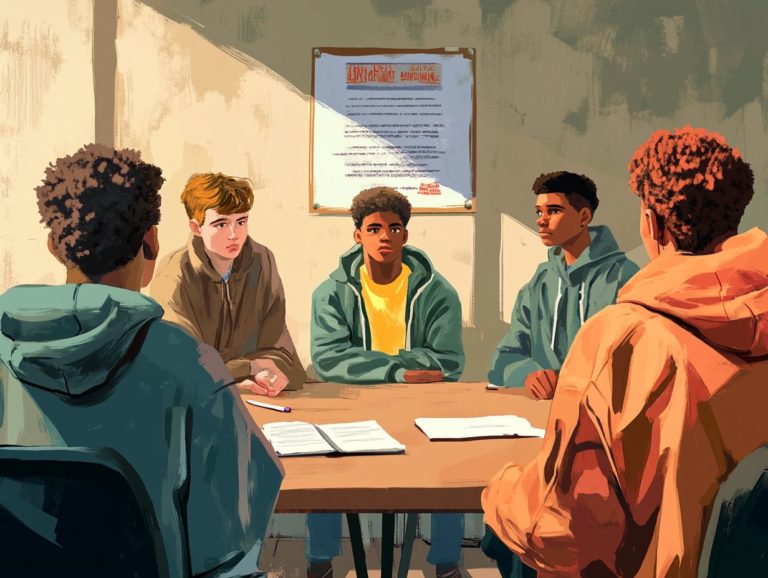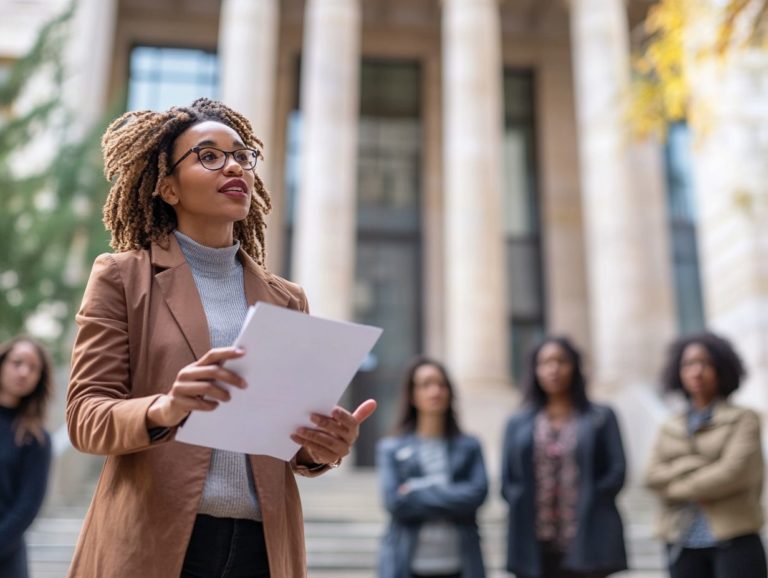The Impact of Social Media on Rights Awareness
In today’s digital landscape, social media plays a pivotal role in shaping your understanding of rights and advocacy. It serves as a powerful platform for awareness, enabling movements to gain traction and amplifying voices that need to be heard.
However, these channels can also spread misinformation and be breeding grounds for online harassment. This article delves into the dual nature of social media’s impact on rights awareness, showcasing successful campaigns, highlighting the challenges you may encounter, and presenting strategies to harness its potential for good.
Explore this intricate terrain! Discover how to cultivate a more informed online community.
Contents
- Key Takeaways:
- Defining Social Media and Rights Awareness
- The Role of Social Media in Promoting Rights Awareness
- The Negative Effects of Social Media on Rights Awareness
- Ways to Use Social Media for Positive Impact on Rights Awareness
- Frequently Asked Questions
- What is the impact of social media on rights awareness?
- How does social media help in promoting rights awareness?
- Can social media be used as a tool to advocate for human rights?
- What are the potential risks of using social media for rights awareness?
- How can individuals use social media to increase their own rights awareness?
- In what ways has social media impacted rights awareness globally?
Key Takeaways:
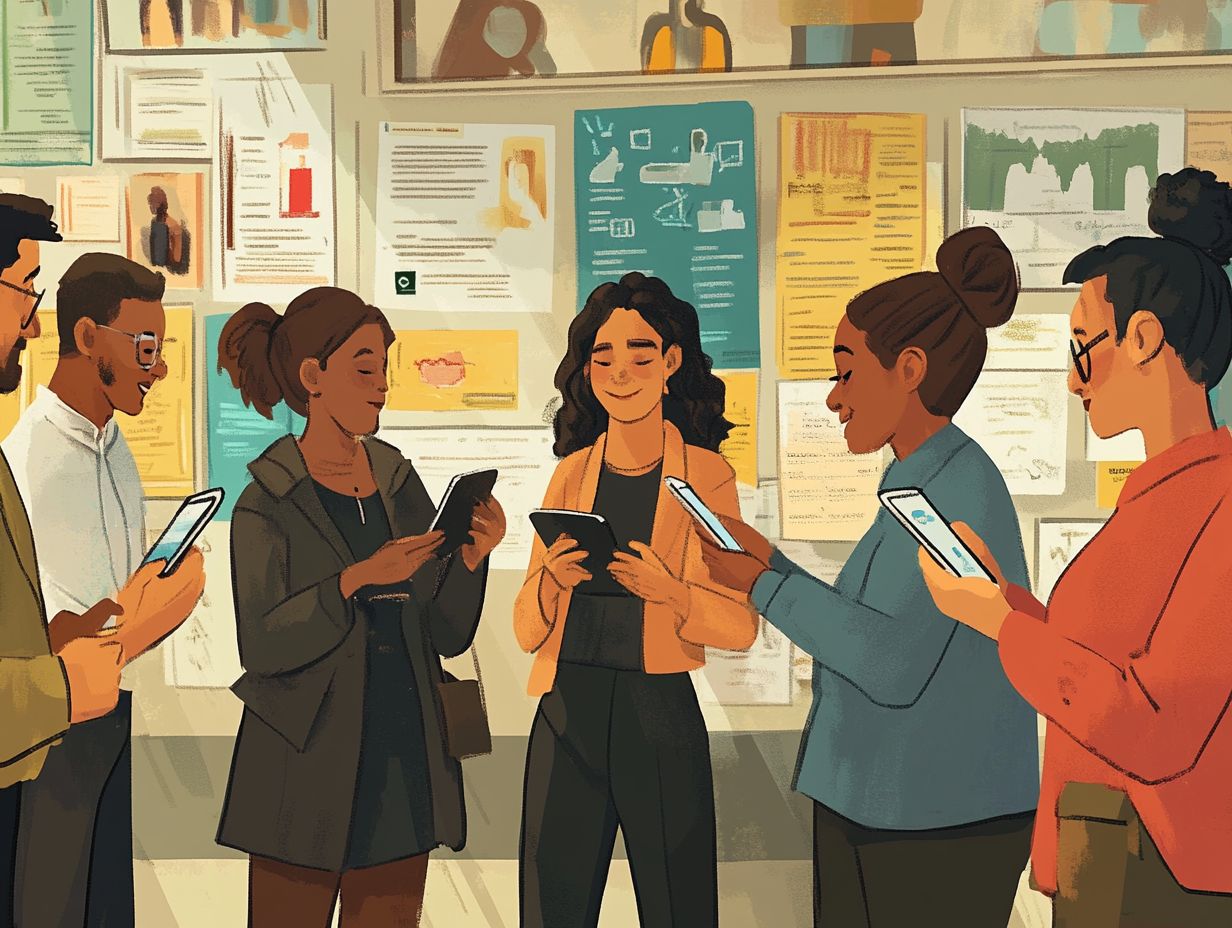
- Social media amplifies voices and showcases successful campaigns.
- However, it can spread misinformation and facilitate online harassment.
- To make a positive impact, build safe online communities and collaborate with influencers.
Defining Social Media and Rights Awareness
Social media has revolutionized rights awareness and activism. It offers you an active space to share personal stories and experiences.
This platform invites you to engage in meaningful discussions about human rights. It also enables you to bring people together on critical issues, including disability rights and systemic discrimination.
With its vast global reach, platforms like Twitter, Facebook, and Instagram allow you to disseminate vital information. They foster community engagement and raise awareness about accessibility challenges faced by marginalized groups.
The Role of Social Media in Promoting Rights Awareness
By leveraging social media, you can amplify voices and drive meaningful change in society. It effectively documents human rights violations while providing support for victims of discrimination and harassment.
Examples of Successful Campaigns
Look at powerful campaigns like Black Lives Matter. This movement skillfully harnessed viral content to confront systemic racism and shed light on police brutality, capturing public attention and advocating for essential social change and justice.
Similarly, the #MeToo movement utilized these platforms to amplify survivors’ voices. It challenged deeply entrenched societal norms surrounding sexual harassment and assault.
By sharing personal stories, participants forged a powerful wave of solidarity that encouraged many to speak out. This ultimately influenced legislative change and prompted organizations to re-evaluate their policies.
On another front, Ocean Conservancy launched the #TeamOcean campaign, mobilizing individuals for coastal cleanups. This initiative showcases how social media can spark grassroots activism and foster environmental awareness.
These campaigns highlight urgent issues and exemplify the potential of digital platforms to connect communities, stimulate conversations, and galvanize collective action toward meaningful reform.
How Social Media Amplifies Voices and Causes
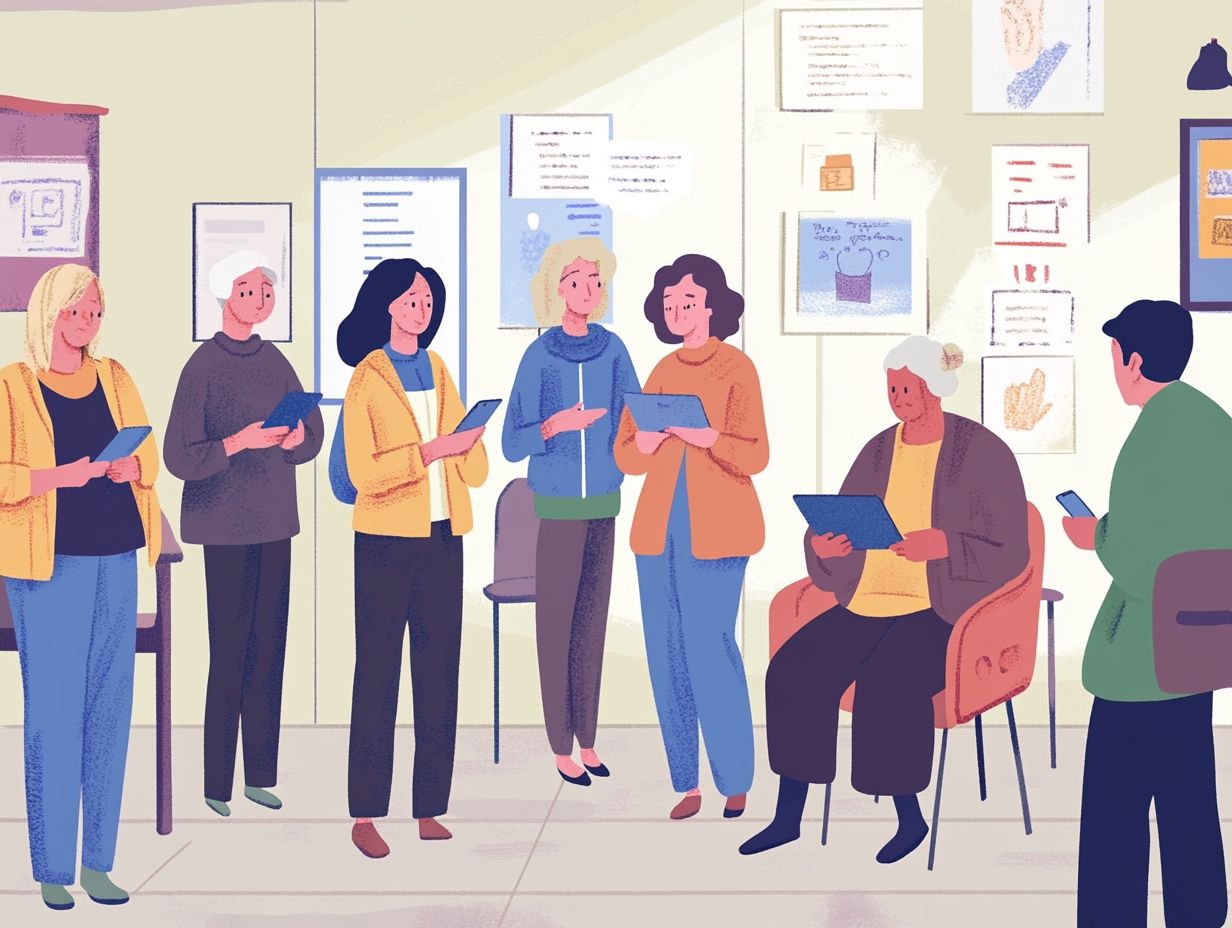
Social media serves as a powerful amplifier for voices and causes. It provides a platform to elevate victims’ narratives and empower local community members working for change.
This digital landscape offers you the chance to share your story widely. You can forge connections that transcend geographical divides and nurture solidarity among diverse communities.
By harnessing hashtags and viral trends, you can organize initiatives that capture public attention, galvanizing collective action.
These platforms encourage discussions. They allow you to engage in conversations that shape public opinion and challenge prevailing narratives.
As these dialogues unfold, they often catch the eye of policymakers, compelling them to reconsider their stances based on the amplified concerns you and others raise.
In this way, social media makes information available to everyone and acts as a catalyst for meaningful societal change.
The Negative Effects of Social Media on Rights Awareness
While social media can foster positive change, it can also contribute to the spread of misinformation, online harassment, and discrimination.
These negative consequences undermine the very awareness of rights that social media aims to promote. They complicate crisis communication and potentially stifle progress.
Spreading Misinformation and False Narratives
The spread of misinformation and false narratives on social media distorts your understanding of human rights issues. This complicates your advocacy efforts for systemic change.
It becomes essential for you to establish a robust verification process. When you encounter misleading information, you may unwittingly support initiatives built on shaky foundations.
For example, campaigns aimed at addressing racial injustice can be easily derailed by rumors that oversimplify complex societal problems. This creates divisions instead of fostering unity.
Without diligent fact-checking, you risk amplifying harmful stereotypes, perpetuating systemic injustices. In this digital age, prioritizing the verification of sources and evidence is crucial.
Doing so enables you to counter false narratives and enhances your effectiveness in promoting awareness of vital human rights topics.
The Dangers of Online Harassment and Cyberbullying
Online harassment and cyberbullying present serious threats to advocates for human rights. These dangers often lead to mental health challenges and can discourage community engagement.
You might fear discrimination and targeted attacks, creating a hostile environment that dissuades many from voicing their opinions.
The psychological impact on victims reveals itself through anxiety, depression, and a debilitating sense of isolation, all of which can impede your advocacy efforts.
For many activists, the fear of becoming targets fosters a chilling effect, silencing the desire to raise awareness about pressing issues. This cycle weakens the collective strength of movements aimed at promoting human rights.
Ways to Use Social Media for Positive Impact on Rights Awareness
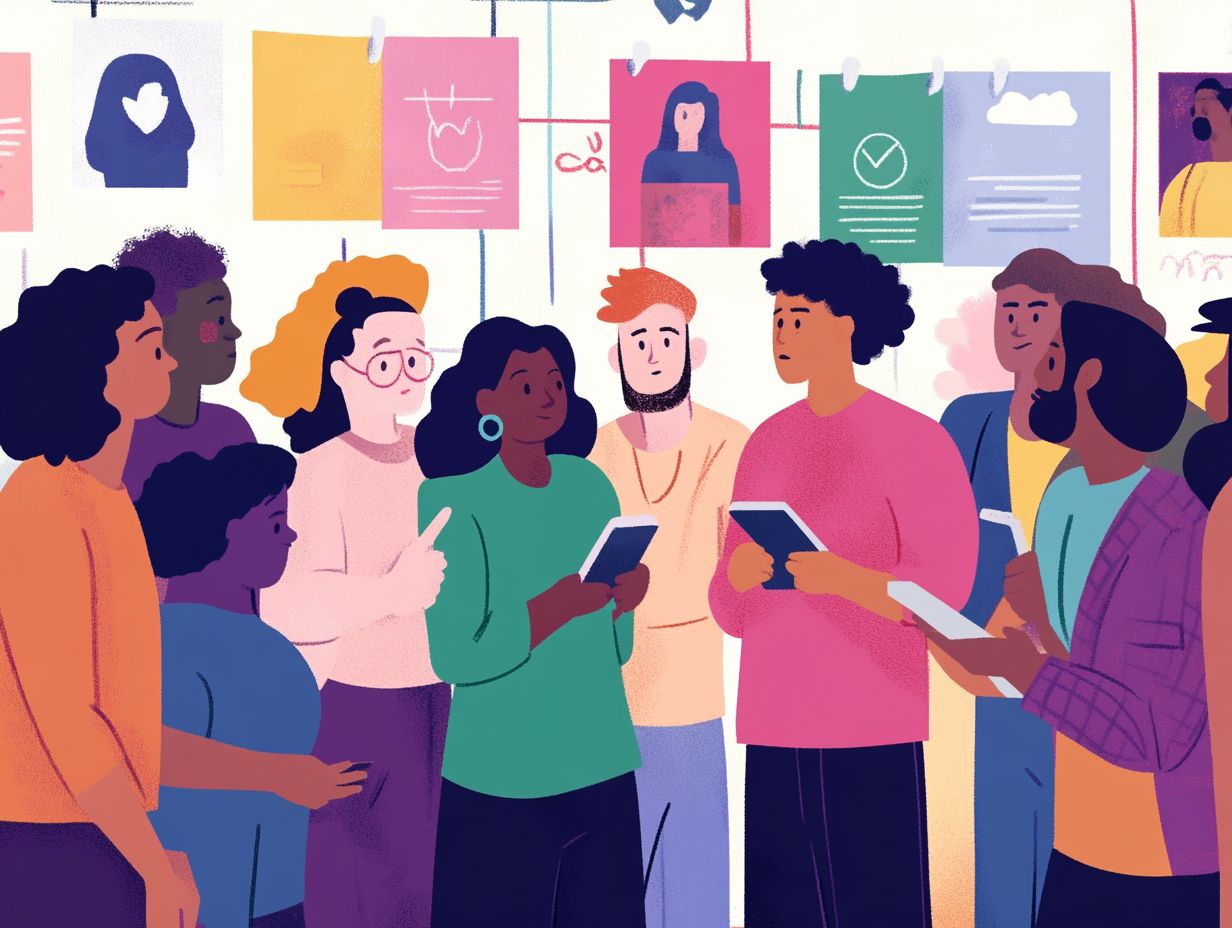
You can powerfully harness social media to create a meaningful impact on rights awareness.
Use effective strategies and tools to engage your community. This enables individuals to take action and share their experiences.
This approach amplifies voices and cultivates a collective commitment to change.
Building Inclusive and Safe Online Communities
Building inclusive and safe online communities is crucial for creating a supportive environment where you can engage in meaningful conversations about rights awareness and share your personal stories without the fear of discrimination or harassment.
To create such spaces, it’s important to establish clear guidelines that respect the diverse identities and experiences of all users. This approach helps build trust and encourages participation.
Accessibility is also essential; platforms should be designed with usability in mind, ensuring they accommodate individuals with varying abilities and levels of technological access.
Encouraging community engagement through interactive activities, like discussions and feedback sessions, further strengthens these networks, making everyone feel valued and heard.
Embracing these practices allows online communities to become vital sanctuaries for connection, enabling you to express yourself and collectively advocate for change.
Collaborating with Influencers and Organizations
Collaborating with influencers and organizations can supercharge your advocacy efforts in rights awareness, allowing you to leverage their reach and credibility to spread powerful messages of social change and rally support for critical causes.
By aligning with individuals who have a substantial following on social media and partnering with established organizations, you can create a combined impact that boosts your visibility.
For example, when a human rights organization joined forces with a well-known celebrity influencer for a campaign on gender equality, the initiative reached millions, igniting widespread discussions and engaging a diverse audience.
These collaborations lead to shared resources and increased fundraising opportunities, enabling you to craft compelling narratives that resonate deeply with the public.
Ultimately, such partnerships elevate the conversation around crucial issues and foster a community of supporters who are committed to enacting real, tangible change.
Frequently Asked Questions
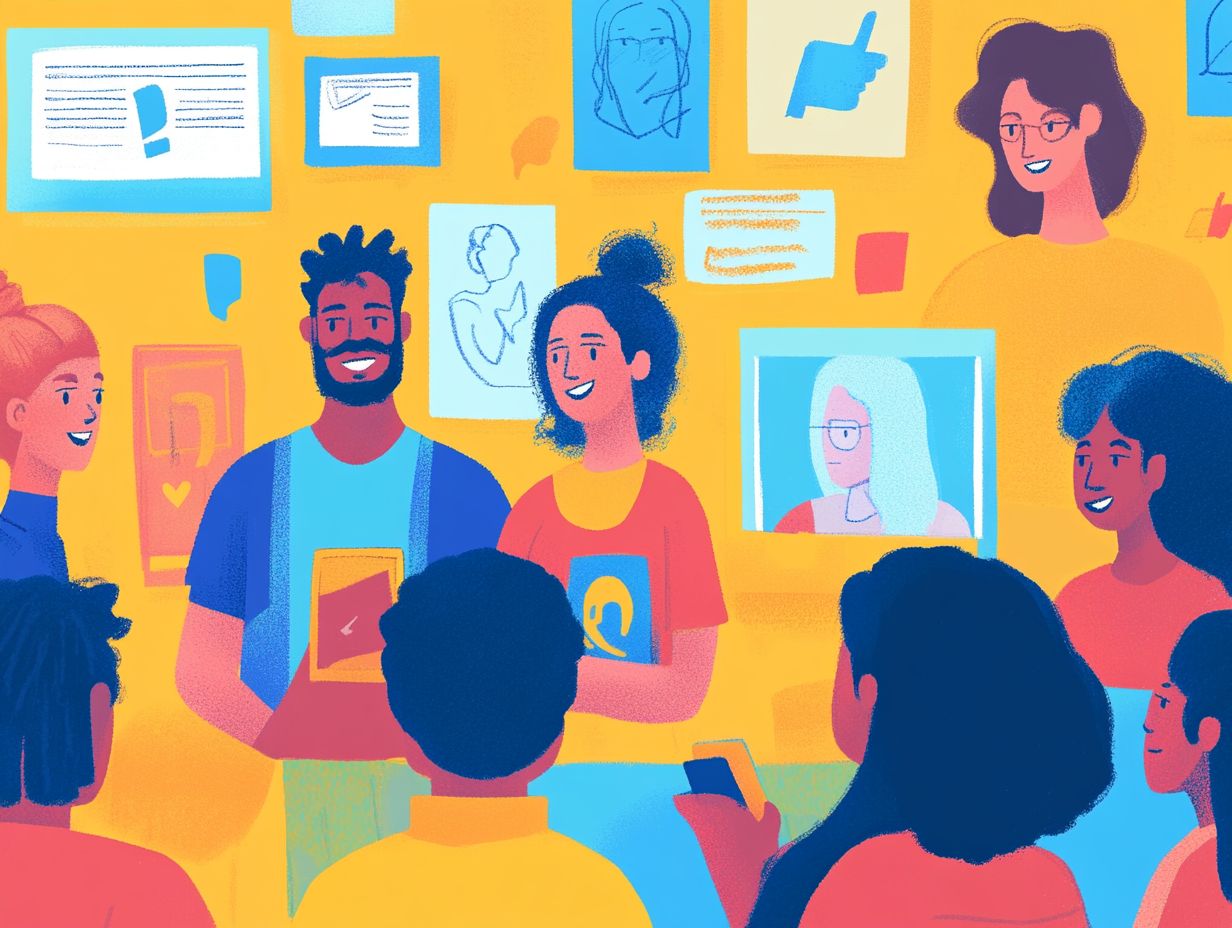
Social media has greatly increased the reach and accessibility of information, allowing for a larger audience to become aware of their rights and the rights of others.
Through social media platforms, individuals and organizations can easily share educational content, news, and updates regarding human rights issues, thus promoting awareness and understanding.
Yes, social media can be a powerful tool for advocating and raising awareness for human rights issues, as it allows for the dissemination of information to a wide audience and can facilitate online activism, or digital campaigning, to promote change.
One potential risk is the spread of misinformation or fake news, which can lead to confusion and misunderstandings about human rights issues. There is also the risk of online harassment and cyberbullying, which can deter individuals from engaging in discussions about rights awareness.
Individuals can follow and engage with reputable human rights organizations and activists on social media to stay informed about current issues and learn about ways to get involved. They can also participate in online discussions and share educational content to raise awareness among their own networks.
The widespread use of social media has allowed for the amplification of voices and stories from marginalized communities, bringing attention to human rights issues around the world. It has also facilitated global solidarity and support for rights causes, leading to real-world impact and change.
Join the conversation on social media today and help raise awareness for human rights!

